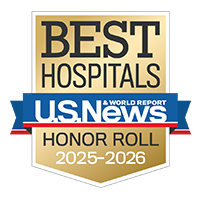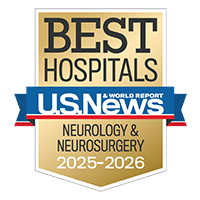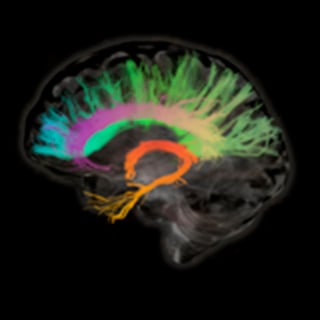
Huntington's Disease & Ataxia Clinic
The UCSF Huntington's Disease and Ataxia Clinic, part of the Memory and Aging Center, cares for patients with Huntington's disease and spinocerebellar ataxia, as well as those at risk for these inherited disorders. We also treat patients with other neurodegenerative ataxias, such as multiple system atrophy (MSA).
We understand that the challenges of living with a degenerative movement disorder can extend well beyond the symptoms of the disease, so we provide a range of support services for patients and families. Our team of experts, which draws from neurology, genetic counseling, physical therapy, nursing and social work, collaborates with patients and their caregivers to create personalized and comprehensive treatment plans. We also work closely with the UCSF Movement Disorders and Neuromodulation Center, which evaluates and treats patients with various movement disorders.
Our clinic is part of the UCSF Weill Institute for Neurosciences and is recognized as a center of excellence by both the Huntington's Disease Society of America (HDSA) and the National Ataxia Foundation (NAF).
Our services
We offer a variety of support services for people with Huntington's disease and ataxia, including:
- Genetic counseling and testing
- Long-term care planning
- Palliative care
- Physical therapy consultations
- Support groups and psychiatric care
- Symptom management and drug therapy
To learn more about our services, please give us a call at (415) 353-2057.
Join a research study
We help patients participate in studies focused on understanding, treating and curing Huntington's disease, spinocerebellar ataxia and MSA through our work with the Huntington Study Group and the Clinical Research Consortium for the Study of Cerebellar Ataxia. To join or learn more about clinical trials and other research, please email us at [email protected].
You can also find out about study opportunities around the world from the National Library of Medicine.
Doctor referral required
Our locations
Our team
Clinical trials
Enroll -HD: A Prospective Registry Study in a Global Huntington's Disease Cohort
The motor section of the UHDRS assesses motor features of HD with standardized ratings of oculomotor function, dysarthria, chorea, dystonia, gait, and postural stability. UHDRS 99 Motor, UHDRS Diagnostic Confidence Level.
Recruiting
Cerebral Autosomal Dominant Arteriopathy With Subcortical Infarcts and Leukoencephalopathy (CAD...
A composite Cognitive Executive Function Score will be reported based on data from two electronic assessments (Favorites and Match). Favorites tests both episodic and associative memory and consists of 2 learning trials followed b...
Recruiting
Awards & recognition
-

Among the top hospitals in the nation
-

Best in the West and No. 2 in the nation for neurology & neurosurgery
Helpful resources
Support services
Plan your visit
What to Bring
- Photo I.D.
- Health insurance card
- Insurance authorization, if required
- Doctor's referral, if required
- Recent test results related to your condition
- List of your medications, including dosages, plus any you're allergic to
- List of questions you may have
- Device or paper for taking notes
Related clinics
Our research initiatives
-

UCSF Memory and Aging Center Research
The UCSF Memory and Aging Center conducts research to test potential new treatments for neurodegenerative diseases, as well as studies aimed at improving understanding of these conditions.






















